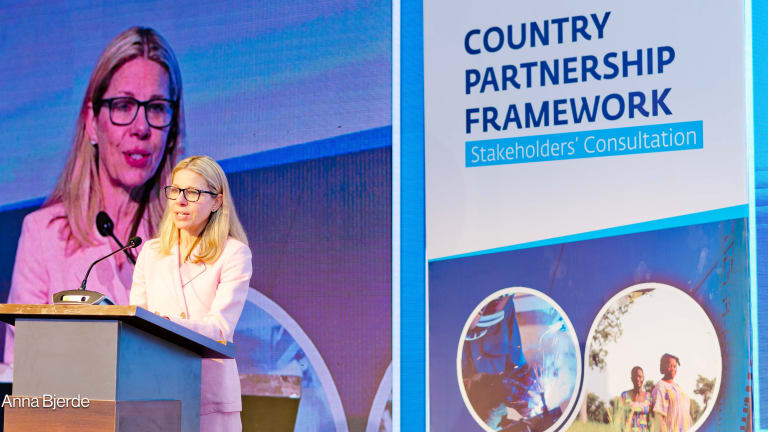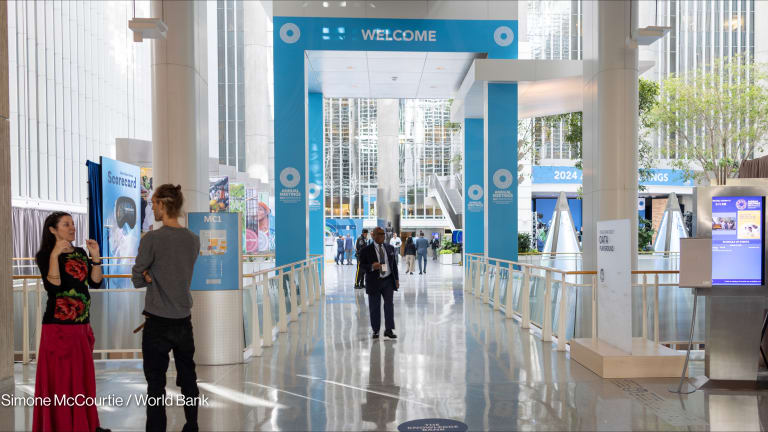
In recent years, Plan International has partnered with Barclays on savings products, Credit Suisse on financial education programs, and Unilever on WASH initiatives.
While such corporate partnerships are no longer a rarity in the development sector, few organizations have pursued them with such zeal and to such impact as Plan. By working with corporations at the junction where their needs meet those of a development project’s, organizations can reach far more people than with grants alone, says Plan International UK Chief Executive Officer Tanya Barron.
“NGOs think we are very good at going the last mile. Actually, organizations like Unilever and Coca Cola, they are really, really good at going the last mile,” says Barron.
After all, no matter how remote the village, you’re likely to find a Coke or bar of Lifebuoy soap, she points out. Barron sat down with Devex at the Asian Development Bank’s 50th annual meeting to explain how to utilize those structures, what Plan looks for in a corporate partner and why this may well be the key to sustainable change. This interview has been edited for length and clarity.
Why does Plan seek out these types of partnerships?
“It’s far more exciting and much bigger changes happen, I believe, when you work with corporates on projects that are within their own interests.”
— Tanya Barron, CEO of Plan International UKThere are lots of benefits. One of the things that we find with partnering with the private sector is if you can move away from the sort of old style corporate social responsibility and grants, and move into working with corporates within the stream of their own interests, it works brilliantly.
That’s what we did with Barclays. We had a fantastic six-year program with them, involving 200,000 young people as young savers, and then helping them move into work. And the same with Credit Suisse. And we’re doing something quite similar with Unilever where we work with them within their own interests.
What I mean by that, is that in the olden days, you’d be looking to corporates to give you a nice check — and that’s fantastic! Who would say no? We don’t turn them down. But it’s quite unsustainable, and it’s stop-start. And it’s charitable in an unhelpful way. It’s far more exciting and much bigger changes happen, I believe, when you work with corporates on projects and works that are within their own interests, where there is benefit. That is really win-win-win.
With the Unilever project, we are very happy that the program will help them sell their soap. We have no problem with that.
Can you tell me about that program?
It’s a project that will get about 6 million people in Pakistan and Bangladesh to have healthy lives through sanitation and hygiene. It’s about stopping open defecation and putting in place hand washing habits. It sounds simple, but it’s notoriously difficult to get people to change social behavior.
Unilever have come up with some interesting research from their own School of Five, an initiative to get people to wash their hands five times a day.
Their capacity to deliver — it’s what they do. Our capacity to make sure there’s an understanding of social change and how you change social behavior and how you include everyone in — that is what we can bring to the table.
—Plan International comes in because we’re very trusted in communities, and also because we really understand how important it is to have projects not leave anybody behind. We really do care that girls and young women and disabled people have access to washing points and water points.
That isn’t always the first thinking of the corporate sector. They do really well with the low-hanging fruit and get the 90 percent to do it. We want to get that last 10 percent included, and to be part of the change.
We can go to scale with the corporate sector. They don’t all have to be huge, there is a value in doing research programs to create evidence on a small scale. We do have the capacity to go to really interesting scale, where governments can see the change and then governments can take on a lot of that responsibility.
It’s quite interesting, because as NGOs we always used to think we were good at going the last mile. Actually, organizations such as Unilever and Coca Cola are very very good at going the last mile. On your travels, when you’ve been to the most obscure, remote place, is there not always a chilled cabinet with a Coke in it? It’s extraordinary. You can go to the most remote village in rural India and there will be Lifebuoy soap. Their capacity to deliver — it’s what they do. Our capacity to make sure there’s an understanding of social change and how you change social behavior and how you include everyone in — that is what we can bring to the table. So they’re great partnerships.
And with banks like Credit Suisse, what do they get out of it? These are not people who can put money in the bank, are they?
That was exactly the problem, and it still is. The people themselves thought they were too poor to save. The banks thought they were unbankable and too expensive to bank. These are people with very small amounts of money, living far from the banks. There’s a lack of security — all the things which would make a bank say: Oh that’s not affordable. So what we’ve done with our banking programs is say: Take it the other way around. What would make these people bankable? Not assuming that everyone wants a formal bank account, but some do.
Barclays worked with us and created new products that were group banking products, which they’ve never done before. It was a whole new way of quite traditional development projects on group savings, which rely on group responsibility and community dependencies, with modern banking. Against quite a lot of opposition internally, they developed these new group products, and enabled people in a village to open one account together. So only one person makes the trip into town, and of course now there’s e-banking. The whole idea is changing quite fast. We had some great examples in Kenya, where the bank managers, after two years, became the biggest converts. There was one bank manager at Barclays who said he now sees thousands of customers that he didn’t even know existed.
Plan International has a really unique view of public-private partnerships, I don’t think many organizations do that.
“At Plan, we’ve never been ideologically opposed to the private sector.”
—I think it’s true. I think we were quite pioneering. At Plan, we’ve never been ideologically opposed to the private sector. Perhaps in the past, there was some sense that development organizations saw themselves as at odds in some respects with the commercial exploitation. Certainly one has to be open-eyed about all this. There are extractive industries, for instance, that are not giving a fair share back to communities. But working with the right sort of global corporations who get that prosperity is a mutually reinforcing thing is, I think, where it’s at.
Devex is on the ground at the ADB 50th Annual Meeting. Stay tuned to Devex for coverage.
Search for articles
Most Read
- 1
- 2
- 3
- 4
- 5








